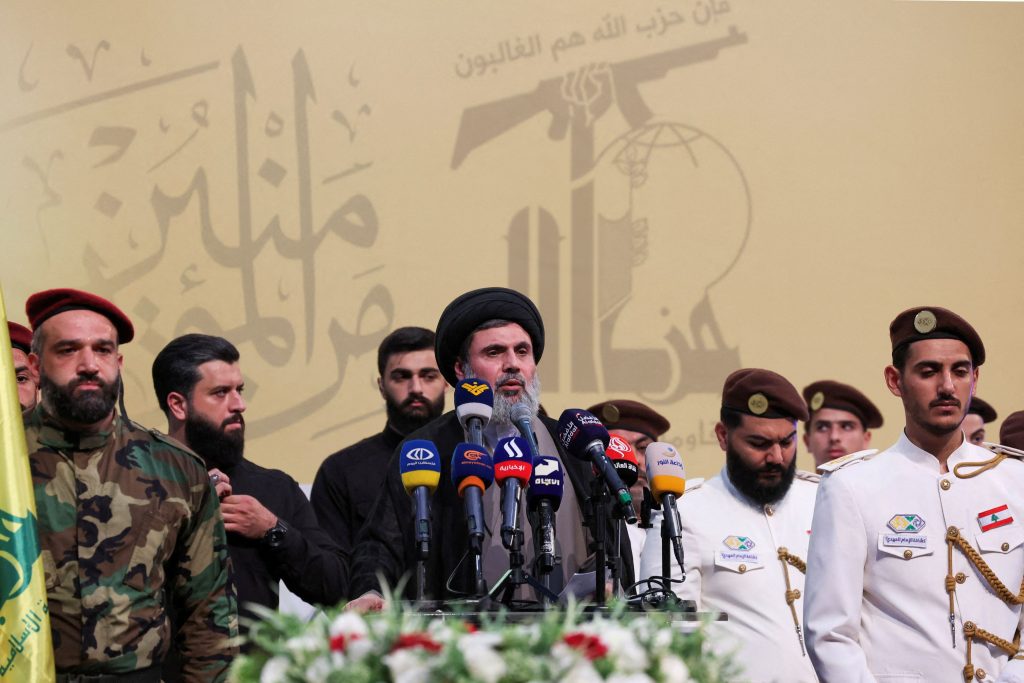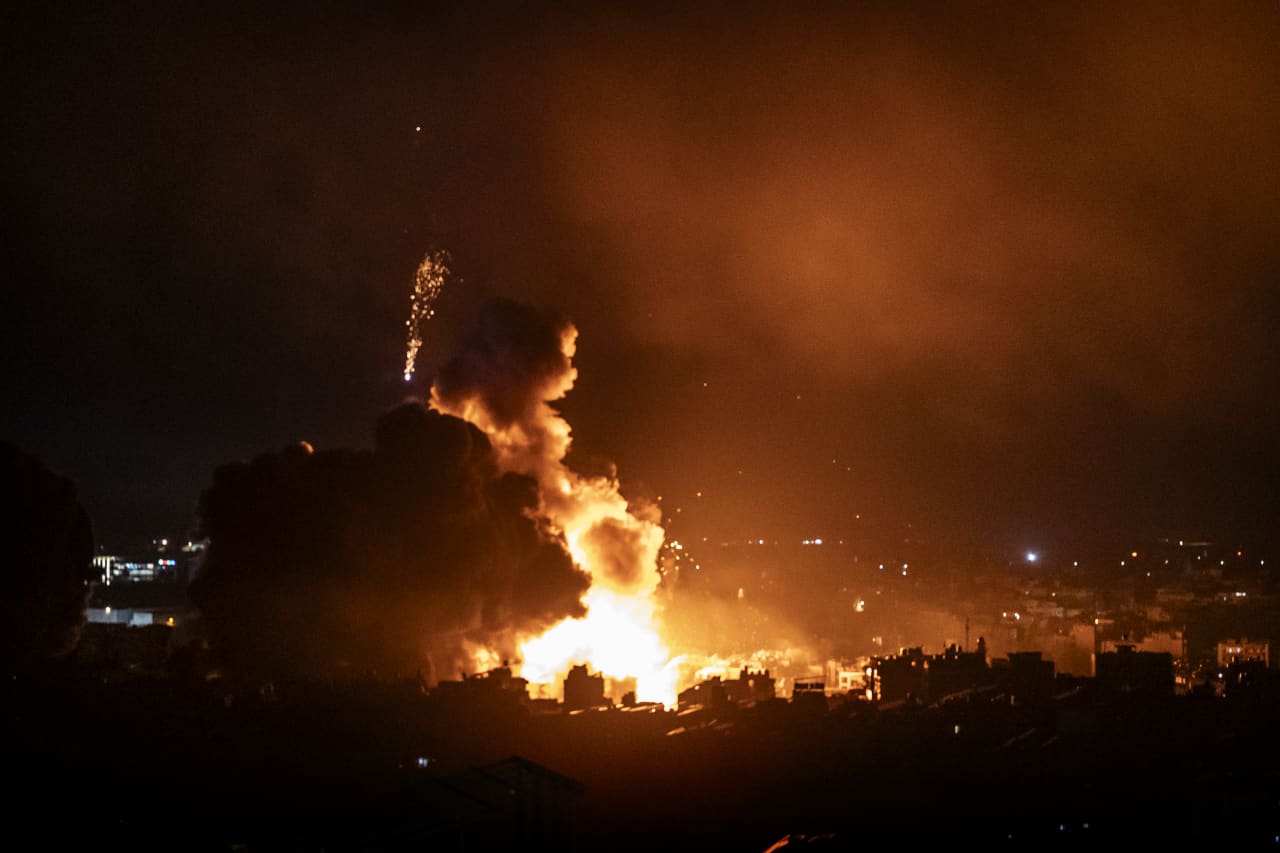BEIRUT—Israel targeted Hezbollah likely successor to slain leader Hassan Nasrallah with heavy airstrikes on Beirut’s southern suburbs Friday, as it continues to try to dismantle the Lebanese militant group’s leadership structure .
The attempt on Hashem Safieddine was the latest in a series of aggressive Israeli attacks on the group, including an intelligence operation that caused thousands of electronic devices carried by Hezbollah members to explode at roughly the same time, a strike that killed most of its top military leadership and an air campaign against more than 3,000 targets across Lebanon.
It wasn’t clear whether Friday’s strike killed Safieddine, who was meeting other Hezbollah officials.
One strike hit close to Beirut airport. In an apparent escalation, the Israeli military said it also struck near Lebanon’s Masnaa border crossing after an Israeli military spokesman on Thursday accused Hezbollah of using the crossing to import military equipment.
A strike in the area created a deep gash the width of the four-lane mountain pass that blocked traffic to Syria. The crossing in the Bekaa valley is one of the few remaining routes out of Lebanon.
Around 160,000 people, largely Syrian refugees, have fled into Syria since fighting escalated in September, mostly through Masnaa, according to the United Nations. Syria’s state news agency SANA said people continued to cross the border on foot after the strike.
More than 1,000 people have been killed since September, including 37 on Thursday, according to Lebanon’s Health Ministry.
Meanwhile, Houthi-run media reported Friday that roughly 15 strikes hit cities in Yemen, including the capital Sana’a and the port city of Hodeidah. In San’a, the strikes targeted areas with Houthi military presence, according to a former official in the Houthi-led government. The U.S. has conducted strikes in Yemen, a U.S. defense official said.
An Iran-backed Iraqi militia also said it had launched drone attacks Friday against Israeli targets in northern Israel and the Israeli-controlled Golan Heights. The attacks killed two Israeli soldiers in each location. Thirteen Israeli soldiers have died since Israel launched ground operations against Hezbollah in Lebanon earlier this week.
Israel has promised a forceful retaliation to Tuesday’s ballistic-missile attack by Iran, Hezbollah’s main backer, which said it was retaliation in part for the killing of Nasrallah last week.
President Biden has suggested he is considering whether to support an Israeli strike on Iranian oil facilities. Asked Thursday night about the chances of averting an all-out war in the Middle East, he said: “How confident are you it’s not going to rain? Look, I don’t believe there is going to be an all-out war. I think we can avoid it. But there is a lot to do yet.”
Asked if he would send American troops to help Israel, he responded: “We have already helped Israel. We are going to protect Israel.”
In a sign of Nasrallah’s importance to Iran, the country’s Supreme Leader Ayatollah Ali Khamenei led Friday prayers in Tehran and delivered a sermon praising the missile attack on Israel and threatening to carry out more in the future if necessary.
At a huge mosque, a brother of Safieddine sat beside him, while senior military and security officials attended and regime supporters waved Hezbollah flags and banners depicting Nasrallah, some crying during his eulogy.

FILE PHOTO: Senior Hezbollah official Hashem Safieddine speaks during the funeral of Mohammed Nasser, a senior Hezbollah commander who was killed by what security sources say was an Israel strike on Wednesday, in Beirut’s southern suburbs, Lebanon July 4, 2024. REUTERS/Aziz Taher/File Photo
Khamenei, 85, his voice hoarse, spoke mostly in Arabic rather than his native Farsi, addressing the Lebanese people directly, defending Hezbollah and the Palestinian cause and condemning U.S. support for Israel.
Also on Friday, Iran’s foreign minister met with Lebanese officials in Beirut. Abbas Araghchi said Iran’s ballistic-missile attack was a response to Israeli targeting of Iranian territory earlier in the year. “We don’t plan to continue unless the Israelis continue their attacks,” he told reporters.
Israel on Friday hit Beirut’s southern suburbs with a number of intense airstrikes causing large explosions that leveled several buildings. Swaths of the capital were shaken by the blasts, and large plumes of smoke billowed toward the night sky from raging fires on the ground—scenes reminiscent of the strike that killed Nasrallah.
The Israeli military had warned residents overnight to evacuate specific buildings. It wasn’t clear which of the attacks were aimed at Hezbollah leadership.
At least one strike destroyed four buildings about 3,000 feet from Beirut airport, a Lebanese civil aviation official said. The country’s only airport has so far been spared from nearby attacks but is operating at limited capacity, with most airlines canceling flights in recent weeks.
Safieddine is Nasrallah’s cousin and has long been considered his likely successor . He was born in 1964 and spent years in the top ranks of the Lebanese militant group and was often viewed as Hezbollah’s number two, even if not technically reflected on organization charts.
Safieddine has led Hezbollah’s executive council, which manages many of the group’s social and political activities, and developed strong ties with Iran, completing religious studies there and maintaining relations with senior Iranian officials. His son is married to the daughter of Qassem Soleimani , the Iranian military leader who was assassinated in a U.S. drone strike in 2020, say analysts who track the group.
Hanin Ghaddar , a senior fellow at the Washington Institute for Near East Policy, a think tank, said the strike against Safieddine signals that Israel is determined to continue operations to eliminate the group’s leadership.
“This drastically adds to Hezbollah’s humiliation within its community, and further erodes the trust between its ranks,” Ghaddar said. “It also means that Israel won’t stop or even shift gears after Nasrallah’s assassination.”
Fighting also raged in southern Lebanon. Hezbollah said it launched rockets and artillery across the border at Israeli troops, the northern Israeli city of Safed and the southern Lebanese village of Maroun al-Ras.
The Israeli military said its forces had struck militants from the air and raided compounds in Lebanese villages. It said it confiscated weapons left behind in buildings, including rocket launchers, antitank missiles and an explosive device.
It also urged civilians in more than 30 locations across southern Lebanon to leave their homes, including for the first time inside the seaside city of Tyre, expanding on its evacuation warnings in the country as it intensifies its campaign to push militant group Hezbollah back from its border. Also for the first time, some of the areas it identified for evacuation on Thursday were north of the Litani River, the northern limit of a border zone established by the U.N. after the 2006 war.
The military called on residents to move north of the Awali River, roughly halfway between the Israeli border and Beirut, for their own safety. It comes after Israel sent troops into Lebanon in a ground operation targeting Hezbollah that began earlier this week.
Israeli officials have said in the past that they want Hezbollah to pull its forces north of the Litani River, a waterway that is roughly 18 miles north of the Israeli border and within 8 miles of the boundary at its closest point.
Israel has struck the Beirut area every night for the past week, mostly in the southern suburbs, a residential area where Hezbollah has a strong presence, killing nine and wounding 24 on Thursday alone, according to the health ministry. At least two attacks have hit more central areas, where reconnaissance drones can be heard on a near constant basis.
The evacuation announcement in southern Lebanon, along with a strike in central Beirut near the country’s Parliament on Thursday, raised concerns that Israel could widen its campaign, a move that would likely further destabilize Lebanon, which is scrambling to cope with hundreds of thousands of displaced people.
The Israeli military, already stretched by the escalating conflict in Lebanon and the continuing war in Gaza, also faces demands in the West Bank. It had launched an airstrike in Tulkarem that the military said killed a local Hamas leader and other militants who allegedly orchestrated a recent attempted car bombing.
The Palestinian Health Ministry said 18 people were killed in the strike, which Palestinian news agency WAFA said targeted a cafe. Hamas condemned the attack and called for protests across the West Bank against Israel.
Israel says its air and ground offensive on Lebanon is intended to roll back Hezbollah’s presence along the country’s shared border to return tens of thousands of residents of northern Israel to their homes after a year in which they have been uprooted by the militant group’s attacks.
“Returning the residents means destroying the terrorist infrastructure that Hezbollah has built near the border,” Israeli military chief Herzi Halevi said Thursday. “The damage to Hezbollah in all sectors—Beirut, the Bekaa Valley and southern Lebanon—will continue.”
The war has displaced more than 340,000 people in Lebanon since last year, according to data from the U.N.’s migration organization.
An Israeli military spokesman said this week that Israel doesn’t plan to send forces to Beirut or to cities in southern Lebanon. Among the towns included in the notices on Tuesday was Nabatieh, a large community within 8 miles of the Israeli border.
Write to Stephen Kalin at stephen.kalin@wsj.com and Rory Jones at Rory.Jones@wsj.com



